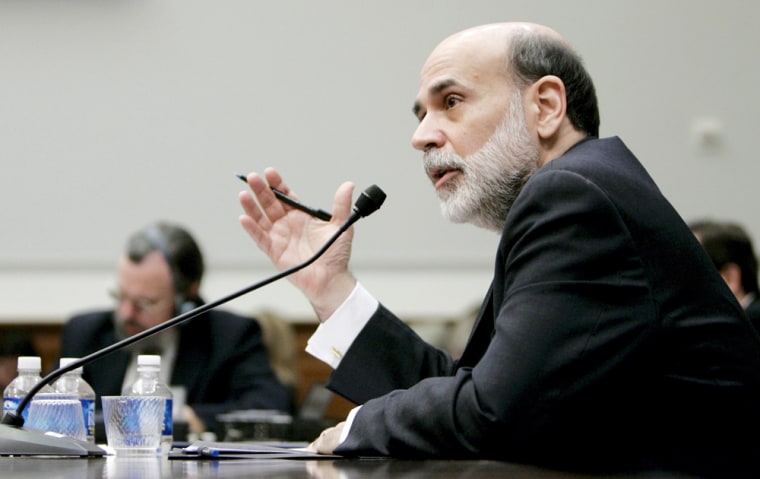Both the White House and the Federal Reserve Chairman Ben Bernanke this week repeated their official forecasts that the U.S. economy should be able to dodge a recession this year — if all goes well. But as Bernanke outlined in back-to-back appearances before House and Senate committees, the list of “ifs” is getting longer.
Bush reminded reporters at a news conference Thursday that it will take time for the recently enacted $160 billion stimulus package to have the intended effect of boosting consumer spending. That spending accounts for roughly 70 cents of every dollar of gross domestic product, which slowed in the fourth quarter of last year to a growth rate of just 0.6 percent.
"I know there's a lot of, here in Washington people are trying to — stimulus package two — and all that stuff,” Bush told reporters. “Why don't we let stimulus package one, which seemed like a good idea at the time, have a chance to kick in?"
Tax rebate checks are expected to begin making their way to consumers’ pockets starting in May. But it’s not clear how many people will head straight to the mall to spend them.
A widely watched consumer confidence measure, reported earlier this week, fell sharply in February along with confidence about job prospects. And a Zogby poll earlier this month found that half of those surveyed said they would use their tax rebates either to pay down debts or save up for a rainy day. Neither of those choices will give the economy the quick boost that Congress and the White House are hoping for.
As they quizzed Bernanke this week on his outlook, some on Capitol Hill wondered aloud if Congress shouldn’t be doing more to help head off the current wave of foreclosures and the resulting damage to confidence and spending.
“My concern is we were behind the curve in trying to deal with the issue,” said Sen. Robert Menendez, D-N.J.. “And my concern is now we seem to be continuing behind the curve in stemming the hemorrhaging that's going on.”
After more than a year of falling sales and prices, the housing market shown no signs of hitting bottom. The latest data, released this week, showed that new home sales continued to fall in January, and the level of unsold inventory climbed. Home values, which helped support consumer spending during the boom years, have been falling in many markets nationwide.
And 30-year mortgage rates, which fell sharply in the second half of 2007, have been rising again — up to about 6.25 percent from 5.5 percent as recently as January.
Home buyers aren't the only ones paying more for loans; tight credit is beginning to crimp business expansion. Sales of so-called durable goods, which includes business equipment, fell by 1.4 percent in January, according to government figures released this week.
“Business equipment and investment spending is carrying very little momentum forward in the early months of 2008,” according to Brian Bethune, an economist with Global Insight.
With banks and investors still sorting through loans that have gone bad, they’re reluctant to make new ones — no matter how much cash the Fed makes available. That’s a big wild card in the forecast that the economy will dodge a recession, Bernanke said Thursday.
“I'm concerned that banks will be pulling back and not making new loans and providing the credit which is the lifeblood of the economy,” he told senators. “In some cases at least, they need to get more capital.”
The Fed’s aggressive cutting of short-term rates is supposed to help banks recover from the big losses they’ve suffered and build up their capital bases. In the last quarter alone, banks have rounded up about $75 billion from various sources, said Bernanke. But the Fed chairman said that despite the capital rebuilding, some banks aren’t going to make it — especially smaller banks that took a big hit on real estate loans.
"I expect there will be some failures," Bernanke said.
Hugh Johnson, Chairman of Johnson Illington Advisors, sees similarities between the current credit crunch and the 1990 recession, when lower interest rates helped lenders get back on their feet after piling up huge losses in the savings and loan debacle of the late 1980s. But he says the industry needs to move quickly.
“Banks have to get going on restoring their health … and get going real fast,” said Johnson. “That’s what you’ve got to simply cross your fingers and hope for.”
The reason for the urgency is that if inflation continues to perk up — as it did last moth — the Fed may not be able to keep pumping money into the banking system for much longer. So far, Bernanke says, inflation seems to be “well-anchored” — meaning it hasn’t begun to spread widely into consumer and market expectations.
But the only surefire antidote to inflation is tight credit and higher rates — which is exactly the opposite of what the Fed is pursuing. While acknowledging that the central banks now finds itself stuck battling both an economic slowdown and inflation, Bernanke said the “downside risk” of recession remains the Fed’s main target.
With rates already at historically low levels, the central bank may find itself with limited ammunition left to get the economy moving again, according to Anthony Chan, chief economist at JP Morgan Private Client Services.
“If the downside risks come to fruition, then what does the Federal Reserve do? Can they keep going lower and lower and lower?” he said. “There are limits because they can't ignore the inflation situation indefinitely.”
